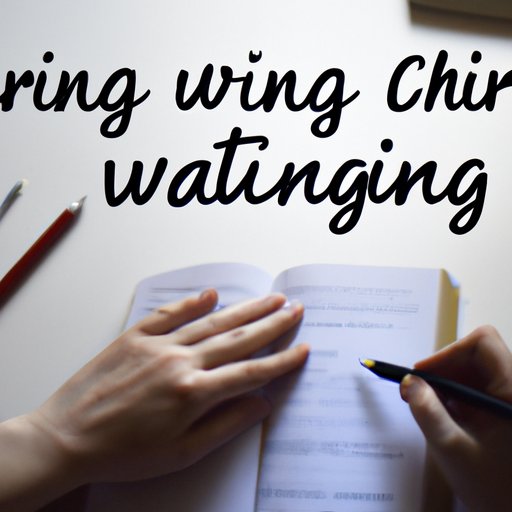Introduction
Writing is an essential skill in any profession or field of study. It is used to communicate information, express ideas, and tell stories. Improving your writing skills can help you become more effective in your work and more confident in your ability to express yourself.
This article will provide tips, tricks and resources to help beginners get good at writing. From reading widely and often to taking a class or workshop, each section will provide useful advice on how to become a better writer.
Read Widely and Often
One of the best ways to get better at writing is to read extensively and often. Reading exposes you to different styles of writing, which can provide inspiration for your own work. It also helps you develop an understanding of grammar and usage, as well as an appreciation for the craft of writing.
Reading can also help you develop your own voice and style of writing. As you read different authors, you will be able to identify elements of their writing that you like, and incorporate those into your own work.
When selecting books to read, make sure to choose a variety of sources. This could include novels, short stories, newspaper articles, magazines, blogs, etc. The more diverse your reading material is, the more you will benefit from it.
Join a Writing Group
Another great way to improve your writing is to join a writing group. A writing group provides a collaborative learning environment where members can share their work, give and receive feedback, and learn from one another. This type of setting can be extremely beneficial for developing your writing skills and gaining confidence in your work.
If there are no writing groups in your area, consider starting one. You can find other writers through local bookstores, libraries, or online communities. Once you have found a few people interested in joining, set up regular meetings and establish guidelines for providing feedback.
Practice Free-Writing
Free-writing is an excellent tool for improving your writing skills. It involves writing continuously for a set period of time without stopping to edit or revise. The goal is to write whatever comes to mind, even if it is incomplete or unorganized.
Free-writing can help you get over writer’s block, generate new ideas, and develop a more natural writing style. To ensure that you are getting the most out of your free-writing sessions, here are a few tips:
- Set aside a specific time each day for free-writing.
- Choose a comfortable, distraction-free space.
- Write without worrying about grammar, spelling, or punctuation.
- Don’t stop to edit or revise – just keep writing!
Keep a Journal
Keeping a journal is another great way to improve your writing skills. A journal allows you to document your thoughts and experiences, practice your writing, and reflect on your progress. It can also serve as a source of inspiration when you need to come up with new ideas.
There are many different types of journals, so you can choose one that best suits your needs. For example, you could keep a travel journal to document your trips, a dream journal to record your dreams, or a writing journal to track your progress as a writer.
Take a Class or Workshop
Taking a class or workshop is a great way to get better at writing. These courses can provide valuable instruction on grammar, usage, and other aspects of writing. They also offer the opportunity to practice your writing in a structured setting, and receive feedback from an experienced instructor.
You can take classes or workshops in person or online. There are also a variety of topics available, ranging from creative writing to business writing. Whichever option you choose, make sure to select a course that meets your needs and interests.
Study Grammar and Usage
Knowing grammar and usage is essential for becoming a better writer. A solid understanding of these concepts can help you communicate effectively, avoid errors, and create more polished pieces of writing.
To learn more about grammar and usage, there are many resources available. You can find books, websites, and videos devoted to the topic. Some of these resources are free, while others require a fee. Regardless of which you choose, make sure to spend some time each day studying grammar and usage.

Experiment with Different Styles of Writing
Another way to get good at writing is to experiment with different writing styles. Trying new approaches can help you gain confidence in your writing, and discover what works best for you. It can also open up new opportunities for creativity and exploration.
Some examples of different writing styles include narrative, descriptive, persuasive, expository, and poetic. Each style has its own set of guidelines, but don’t let that limit you. Feel free to explore and combine different styles to create something unique.
Conclusion
Improving your writing skills takes time and effort, but the rewards are worth it. By reading widely and often, joining a writing group, practicing free-writing, keeping a journal, taking a class or workshop, studying grammar and usage, and experimenting with different styles of writing, you can become a better writer.
So if you’re looking to get good at writing, start today by following the tips and tricks outlined in this article. With dedication and practice, you can become a skilled and confident writer.
(Note: Is this article not meeting your expectations? Do you have knowledge or insights to share? Unlock new opportunities and expand your reach by joining our authors team. Click Registration to join us and share your expertise with our readers.)
